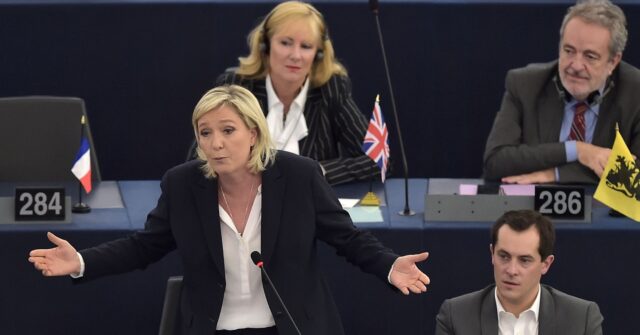The controversial move to ban National Rally leader Marine Le Pen from standing in the French presidential election has been accused of demonstrating double standards, with reports claiming that over a hundred other European politicians violated the same rules without facing prosecution.
A Paris court enacted a five-year ban from running in any election against populist firebrand Marine Le Pen after finding her, and other members of her National Rally party, guilty of “embezzling” European Union funds for political activities in France.
Under EU rules, all Members of the European Parliament are afforded hundreds of thousands to pay for staff and their operations in Strasbourg and Brussels. Le Pen, like many other MEPs before her, was accused of using such funds to pay for other party expenses outside of the transnational parliament.
While the EU has never released a full accounting of all parliamentarians accused of the same misconduct as Le Pen was found guilty of, a 2023 report from the Follow the Money website found that between 2019 and 2022, 139 Members of European Parliament (MEPs), or around one in five members at the time, had been found to have broken the same rules, the Times of London noted on Tuesday.
Yet, according to the report, just one MEP, Eva Kaili, a Greek socialist and former Vice-President of the European Parliament, has faced an actual investigation during the time period studied. However, Kaili was already under heavy scrutiny over her alleged role in the Qatar-gate scandal in which leftist EU parliamentarians have been accused of accepting bribes from the Islamic kingdom, allegedly in exchange for promoting Qatari interests in Strasbourg.
The report found that the other 138 MEPs were merely instructed to return the misused funds to the EU Parliament before criminal charges could be brought.
There have been claims that the rules are enforced selectively, and particularly against politicians who have been critical of the European Union or its Parliament. Indeed, Brexit leader and former MEP Nigel Farage was a notable example of a Eurosceptic politician who had faced investigation for allegedly using EU funds on other expenses and was reportedly ordered to pay back £35,000 to the EU.
Speaking on Times Radio on Monday evening, former BBC journalist Michael Crick said that the misuse of EU Parliament funds by political parties to fund operations in their home countries has been a longstanding open secret known to many journalists and the EU body itself, saying that hundreds of MEPs likely did exactly the same thing that Le Pen was accused of.
“Everybody in the European Parliament was at it, they all knew each other were at it, so they didn’t complain because they would be complained against themselves, so everybody turned a blind eye and the European Parliament as an institution was reluctant to do anything about it because it would go public and undermine the institution of Europe and all that,” he said.
“I am in favour of the European Union, I wish we [the UK] were back in there, but I have to say that if you are a Eurosceptic, you are more likely to fall afoul of all this than if you were a pro-European. The system is unfair and, frankly, there must be hundreds of MEPs and former MEPs saying quietly to themselves ‘I’m not sure if she [Le Pen] has done any worse than I,” Crick remarked.
In contrast to Le Pen, current French Prime Minister François Bayrou, an ardently pro-EU liberal politician, faced similar accusations. While other members of his Democratic Movement (MoDem) party were found guilty of embezzling EU funds, Bayrou was acquitted last year. Even during the trial, prosecutors called for Bayrou to face a three-year ban on running for elections, two years less than the ban placed against Le Pen. Ultimately the court afforded the future PM the “benefit of the doubt” in the case and the charges against him were dropped.
Le Pen has accused the Paris court of acting like those in “authoritarian regimes” and claimed that the remarkable ruling to impose the ban on her seeking public office even during the appeal process — in which the presumption of innocence is typically afforded to defendants in France — was in violation of the rule of law and clearly politically motivated.
The National Rally leader vowed to fight the case on appeal. It is possible that the appeal process could conclude before the 2027 presidential election. However, that is no guarantee, and Le Pen likely faces an uphill battle convincing the typically left-leaning French courts to overturn her conviction.
Follow Kurt Zindulka on X: Follow @KurtZindulka or e-mail to: kzindulka@breitbart.com
Read the full article here


